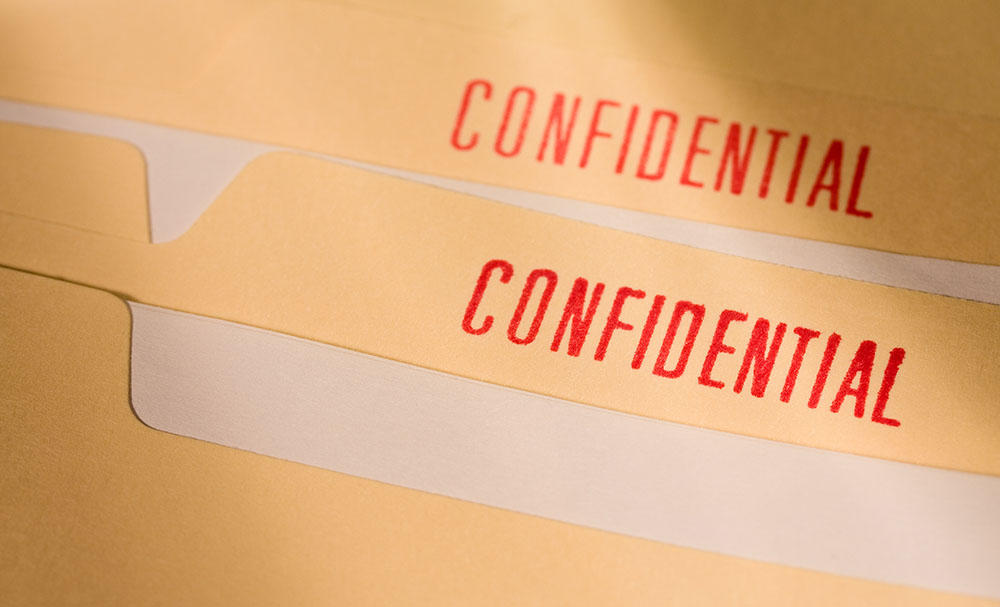
Originally published on December 13, 2012
The saga of journalist Seth Rosenfeld’s successful three-decade struggle to obtain hundreds of thousands of pages of FBI documents.
By Sarah Kraut
In the Sixties, an era defined by the counterculture and social revolution, the University of California, Berkeley became a center of student activism. It was home to the Free Speech Movement, one of the era’s most influential student protests, and a wealth of civil rights and antiwar demonstrations. It was when Ronald Reagan, in his first public office as the state’s governor, campaigned to clean up the “mess” at Berkeley.
In 1981, Seth Rosenfeld, a young journalist at UC Berkeley’s campus newspaper, the Daily Californian, received a call from his editor that would immerse him in this history and come to define the next three decades of his career. The newspaper had obtained about 10,000 pages of documents on protests at the university through a Freedom of Information Act request it filed in 1977–and the editor was giving Rosenfeld first crack at them.
The request had been submitted in the wake of the Watergate scandal and Church Committee Hearings in the mid-1970s, the groundbreaking congressional hearings led by Sen. Frank Church, an Idaho Democrat, on domestic surveillance by the FBI, CIA and military agencies.
“I knew on the one hand the FBI had been found to be involved in unlawful surveillance and harassment of people involved in First Amendment activities elsewhere, and on the other hand that the University of California had been the scene of some of the nation’s earliest and biggest protests of the ’50s and ’60s,” Rosenfeld recalls. “So I was wondering, what was the FBI up to behind the scenes at Berkeley?”
Little did Rosenfeld, who retired from the San Francisco Chronicle three years ago, know that he was embarking on what would become one of the nation’s longest-running and most successful efforts under the Freedom of Information Act. It was a 31-year odyssey in which he would bring five lawsuits and seven federal judges would ultimately order the FBI to release more than 300,000 pages of FBI records concerning the agency’s activities at UC during the Cold War and its covert relationship with then-Gov. Reagan. Thirty-one years later, he’s finally reaching the end of a long, complex journey. He published a book chronicling the information he uncovered, a best-selling work of narrative nonfiction titled “Subversives: The FBI’s War On Student Radicals, and Reagan’s Rise to Power.” And he’s won nearly $500,000 in attorney fees for prevailing in court, an award that will become final December 16, the date by which any government appeals would have to be filed.
Having finally closed the door on this career-defining saga, Rosenfeld now writes as a freelancer and serves as a correspondent for the Center for Investigative Reporting, a nonprofit news outlet based in Berkeley.
“As a journalist,” Rosenfleld says, “this has shown me that it’s important to be very persistent in pursuing a story, and that the FOIA can be a very powerful tool for reporting on government.”
In the months after his editor at the Daily Cal called, Rosenfeld plunged into files, and in 1982 he published a series in the campus newspaper that revealed the FBI’s surveillance and harassment of the Free Speech Movement and the Vietnam Day Committee, a major anti-Vietnam War group based in Berkeley.
But in going through the files, he realized much was missing from the story, and he could see there were records that had been requested but not released. Even before he finished the series, he typed up an expanded FOIA request, seeking “any and all” FBI records on more than 100 different individuals, organizations and events around the University of California during the Cold War years.
“The University of California is one of the nation’s leading public universities, and these conflicts at Berkeley had huge implications,” Rosenfeld says. ” It was a launching point of Reagan’s political career. It was a place where very significant student protests happened and it affected the rest of the country.”
He adds, “I thought it was important to get as complete a record as possible about what the FBI was doing at Berkeley.”
Rosenfeld sent his first FOIA request to the FBI in November 1981 and received a form letter acknowledging the agency had received it. No response of substance, however, came for some time, and when it did, the news was not good.
“They told me they’d be happy to begin processing my request just as soon as I put down the deposit for search and copying fees, which they initially estimated at $35,000,” Rosenfeld says. “They wanted a 25 percent deposit, and I didn’t have it, so I was stumped.”
Then, in 1985, Rosenfeld got in touch with a lawyer named Tom Steel through the Center for Investigative Reporting, who agreed to take his case pro bono. And so began his legal battle with the FBI, with his first lawsuit (filed, as they all were, in U.S. District Court in San Francisco) challenging the agency’s refusal to waive the search and copy fees.
Steel based his case on a clause in the FOIA that states government agencies must waive fees to release documents when there is a “compelling need,” which it defines as being “with respect to a request made by a person primarily engaged in disseminating information, urgency to inform the public concerning actual or alleged Federal Government activity.” U.S. District Court Judge Marilyn Hall Patel rejected the FBI’s claim that the documents were not of public interest and ordered it to waive all fees.
The suit compelled the FBI to release documents on nine subjects, including Clark Kerr, who had been president of UC at the time, and Mario Savio, the leader of the Free Speech Movement. Upon examining the documents, Rosenfeld identified many instances where information seemed to have been improperly redacted or withheld — prompting his second lawsuit.
The FBI cited exemptions listed under Section B of the FOIA as the reason for redacting the records, specifically those allowing agencies to withhold information concerning matters of national security, personal privacy or law enforcement information. This time, Rosenfeld challenged the redactions through a court action called a Vaughn proceeding.
A procedure was established in the 1973 U.S. Supreme Court case Vaughn V. Rosen under which people seeking documents can challenge redactions in court. The requester selects a sample of documents for which the agency files a Vaughn Index, detailing its justifications for withholding each piece of information. The requester files a counter index, setting out reasons why the information should be released. The court receives an unredacted set of the documents, examines them along with each sides’ arguments and issues a ruling. The court’s reasoning applies to similar instances in the remaining documents requested in the case.
The proceeding resulted in court findings in Rosenfeld’s favor, stating the FBI had improperly withheld information based on unfounded claims.
The FBI had withheld considerable information concerning the Free Speech Movement on the grounds that it concerned a law enforcement investigation to determine whether the movement was part of a communist plot to disrupt the nation’s campuses. In the Vaughn proceeding, Rosenfeld gave the court FBI memos showing longtime FBI Director J. Edgar Hoover had ordered the San Francisco FBI to investigate the movement three times, despite being informed each time that the movement was nothing more than a campus protest. The court said that after the date of the third report, there was no doubt that this was not a communist plot, and therefore the continuing surveillance of the students was not a legitimate law enforcement effort; no records could be withheld on law enforcement grounds.
“That was a precedent-setting ruling, because the court was saying was you can have a legitimate law enforcements investigation that becomes illegitimate,” Rosenfeld explains.
Rosenfeld also prevailed in obtaining records documenting the FBI’s covert attempt to convince the university’s Board of Regents to fire then-President Kerr. The FBI claimed the records could be withheld under the law enforcement exemption because they concerned a legitimate background check of Kerr. The court disagreed based on records Rosenfeld had submitted showing Hoover and other bureau officials considered Kerr too liberal and were angry that he had not cracked down on the Free Speech Movement.
Rosenfeld also overcame the FBI’s withholding of records on privacy grounds, demonstrating the information concerned public figures and events or people who were deceased.
The FBI appealed Judge Patel’s decision to the 9th Circuit Court of Appeals, where virtually all of it was upheld by a three-judge panel. The FBI then asked the entire 9th Circuit to review the order, but no judge voted to take the case. It next asked the U.S. Supreme Court to review the case, but Rosenfeld’s attorney reached a settlement with the agency before the high court acted.
In the 1995 settlement, the FBI dropped its challenge to the 9th Circuit ruling on the exemptions and agreed to reprocess the pages according to the ruling. The FBI also agreed to release all of its records on Ronald Reagan up to the point when he became president of the United States in 1980. Additionally, it agreed to pay Rosenfeld’s attorney’s fees in the case up to that point, which by now totaled more than $500,000.
The FOIA has a provision that if a defendant prevails in court by forcing the government to release information, he or she can bring a motion for attorney’s fees for the judge to consider. Though his lawyers had worked for free over the years, they would be compensated with any attorney’s fees awarded to Rosenfeld under this clause.
Finally, the settlement resolved a third suit regarding delays in processing the requests. In that case, Judge Patel had said that at the FBI’s current rate of processing, it would take more than 40 years to release the records; the settlement required the FBI to release them within a year.
In return, Rosenfeld agreed the FBI wouldn’t have to release the identities of confidential informants that it had been ordered to reveal.
In 1996, 15 years into the saga, Rosenfeld had been waging a successful legal war. He had won the fee waiver, gained favorable rulings regarding the exemptions and received about 200,000 pages of FBI documents.
Two years later, his lawyer, Tom Steel, passed away, and the Oakland-based First Amendment Project took over the case, also pro bono. At that point, the FBI had not fully honored the settlement agreement. Project attorneys David Greene and James Wheaton filed several motions challenging the FBI’s continued withholding of certain records, resulting in the release of more than 40,000 additional pages.
“When I started working on the FOIA case, it was considered the most tenured still-pending FOIA request,” Greene recalls.
The FBI had also failed to produce the required records on Reagan. These should have included everything including his years in Hollywood during the Red Scare, his time as governor of California from 1966 to 1974 and another half-decade before he became president.
“This was important, because when Reagan ran for governor, one of his top issues was cleaning up the ‘mess’ at Berkeley, with all the student protests,” Rosenfeld says. “And during the years he was governor, campus unrest was a major issue, so I thought it was important to understand the FBI’s relationship with Reagan.”
The First Amendment Project lawyers brought Rosenfeld’s fourth lawsuit to compel the FBI to release the Reagan records. “We tried to resolve the Reagan records in the initial lawsuit, but nothing was easy in this case,” Greene says. “The FBI fought tooth and nail.”
This lawsuit resulted in important rulings by Judge Patel, who ordered the FBI to conduct additional searches for documents and to release information it had improperly withheld under the law enforcement and privacy exemptions. As a result, the bureau released more than 10,000 pages that revealed a side of Reagan’s life that his biographers had struggled but failed to uncover for years. Garry Wills and Edmund Morris, among others, had expressed frustration in their books about the small group of heavily redacted records that the FBI had released on Reagan.
According to the records, the FBI in 1965 was conducting an investigation into the organized crime operations of Joseph Bonanno. Bonanno was one of the top Mafia leaders in the U.S., and while investigating him in Phoenix, FBI agents made an unexpected discovery: Reagan’s son Michael was “hanging out” with Bonanno’s son Joe Jr. The agents wanted to interview Reagan in an effort to learn of any information his son might have shared with him regarding the Bonannos, but Hoover interceded and blocked them, ordering them instead to warn Reagan about his son’s activities.
“One of the interesting documents released was a summary of Reagan’s reaction when he was warned [by the FBI]. He said he’s very grateful for the warning and he realizes if this information was leaked out, it could damage his political aspirations,” Rosenfeld says. “And that he realized it would be improper to thank Hoover in writing, so he instead asked the agent to express his deep appreciation verbally for him.”
The FBI had withheld much of this record, once again citing exemption under law enforcement. But Patel ordered the FBI to release the information on the grounds that it was not about law enforcement but rather about Hoover doing a personal and political favor for Reagan.
The judge also ordered the FBI to release information showing that Reagan was a more active FBI informant in Hollywood than had been known previously.
“Now,” Rosenfeld says, “we finally have a much more complete record the FBI’s involvement with Reagan.”
As Rosenfeld continued with his research, he interviewed several former FBI agents in an effort to better understand the records. One of them tipped him off that a man named Richard Aoki, a militant radical leader at Berkeley, had been an FBI informants there. After looking into the matter, Rosenfeld interviewed Aoki, who denied being an informant but also said, “People change. It’s complex, layer upon layer.”
When Aoki died in 2009, Rosenfeld submitted a FOIA request for records on him, and it became very clear that the FBI was withholding a lot of information. As a result of a fifth and final lawsuit, filed with the help of another pro bono lawyer, Benjamin Stein, Patel ordered the FBI to release additional information about Aoki, which proved he was in fact an informant. The case is pending as Rosenfeld claims that the FBI is continuing to improperly withhold information on Aoki.
For the past three decades, Rosenfeld has devoted a substantial part of his life to this saga. He has pursued it as an independent project over the years while working first as a reporter for the San Francisco Examiner and later for the San Francisco Chronicle. He took several unpaid leaves over the years to focus all of his energies on it, and since leaving the Chronicle in 2009 has focused on it full time to complete the litigation and the book.
“Subversives” is an in-depth investigation of the FBI’s activities at UC Berkeley during the Cold War — especially during the Sixties — “and how they affected not only the campus, but national politics,” Rosenfeld says.
The three main characters are Clark Kerr, Mario Savio and Ronald Reagan. Rosenfeld traces the narratives of their lives, starting from when they were children, and reveals how they came to be involved with the FBI. He describes their conflict at Berkeley, with Reagan representing the rising conservative tide, Kerr the traditional liberal and Savio the student protest leader.
“I’m really glad to have the book out and pleased that it’s gotten some very good reviews,” Rosenfeld says.
He is also glad that some of the decisions in his case have been useful to other journalists. “It’s gratifying to have helped preserve open government and affirmed the public’s right to know what its government is up to,” he says. “I’m really glad this has strengthened the FOIA.”
He hopes his work will inspire other reporters. “I think this shows that a determined journalist can use the FOIA to force the government to reveal records concerning important historical events and serious misconduct,” he says.
With a long and rich career in journalism under his belt, Rosenfeld says he is looking forward to his next project. But, he adds, “I just hope it wouldn’t take another 30 years.”








Leave a Comment